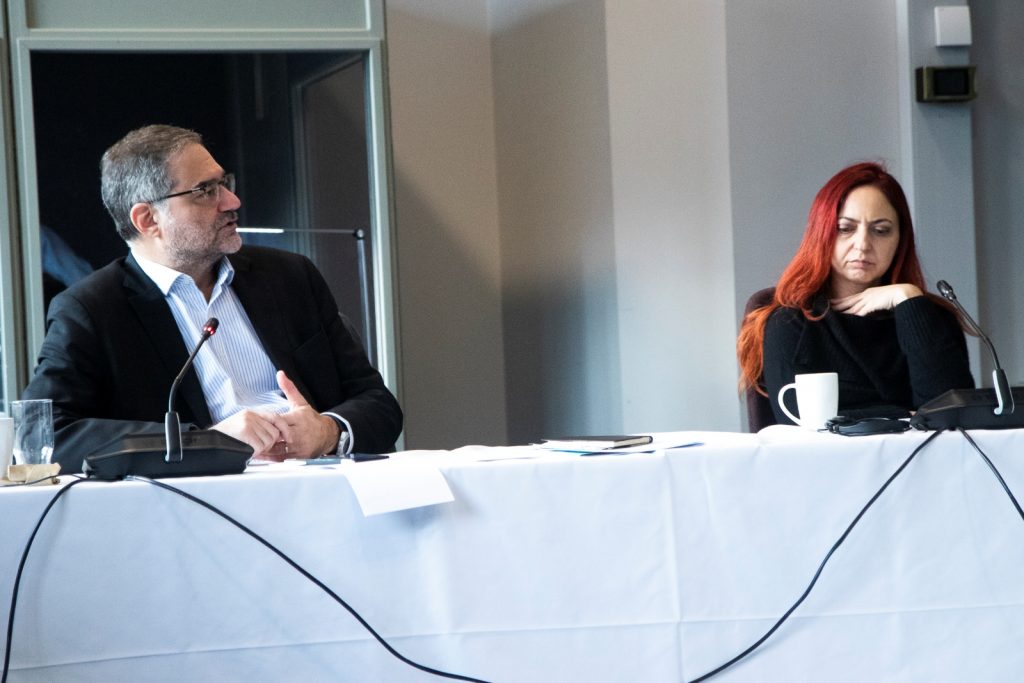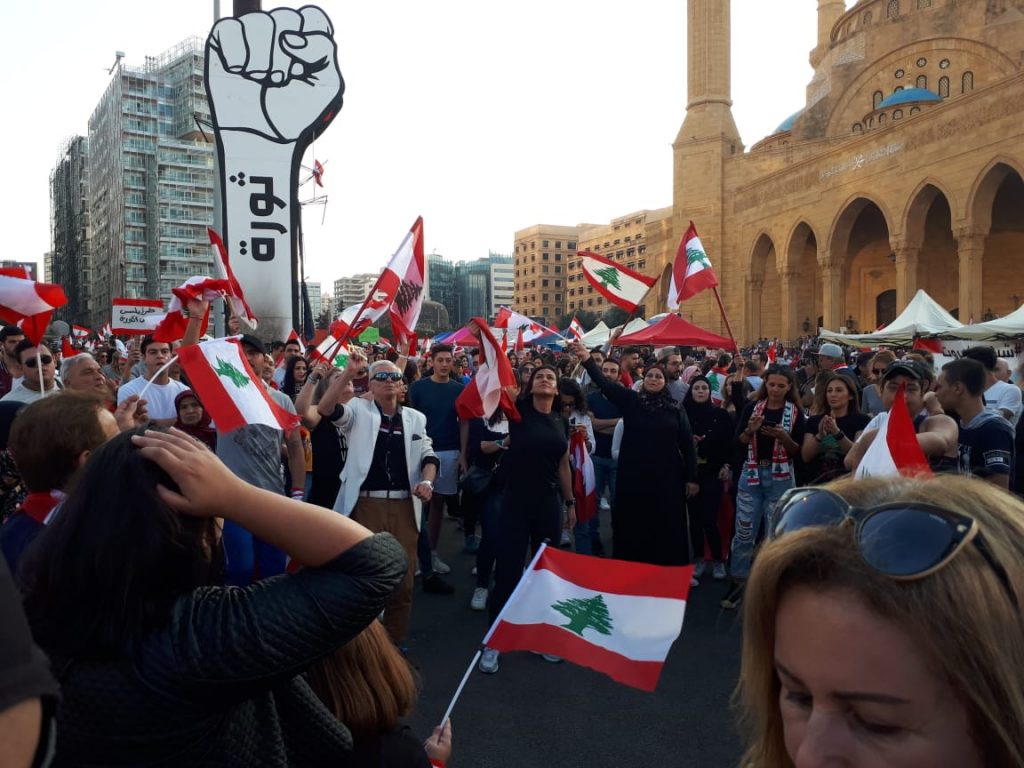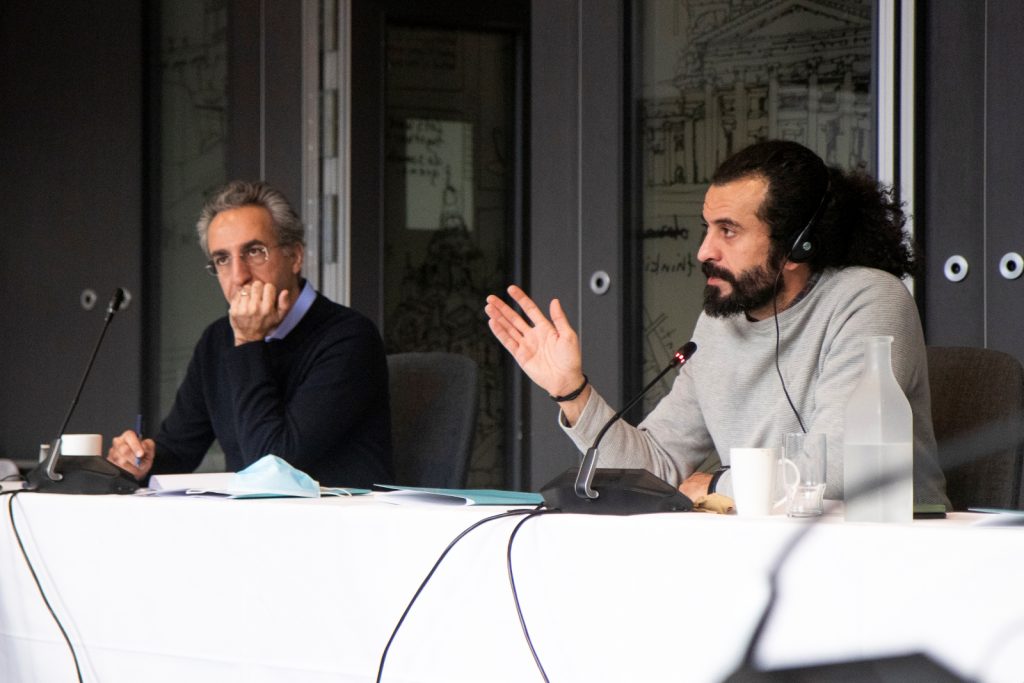Lebanon: Top experts call for end to ruinous sectarianism and for progressive reform towards new democratic citizenship
Afflicted by multiple crises, Lebanon is on the brink of collapse. The country clearly needs to undergo fundamental political change to become a truly democratic society. This was the view of top Lebanese experts taking part in a CMI workshop 1 December. But undoing the sectarian system at the heart of many of Lebanon’s problems will not happen overnight, but will require a reform process leading to change in the long run.

Joseph Bahout, Director of the Issam Fares Institute at the American University of Beirut, and Lina Khatib, Director of the Middle East and North Africa programme at Chatham House, discussed the importance of elections.
The economic crisis in Lebanon has plunged more than half the population into poverty. Politicians have turned a blind eye to the sufferings of their fellow citizens and have continued to enjoy their privileges.
Lebanon’s descent into an abyss has starkly exposed the many flaws of the country’s corrupt, sectarian system of politics.
“The sectarian system in Lebanon is the key driving force behind the country’s economic collapse and political stagnation,” explained Dr. Lina Khatib, Director of the Middle East and North Africa programme at Chatham House. “Therefore, there cannot be a full reform in Lebanon without a change in the sectarian system. This means completely removing it and replacing with a secular political system that is based on merit not on sectarian presentation.”
Since its independence from France in 1943, Lebanon has been governed by a power-sharing system that aims at guaranteeing representation in government, the military and the civil service for all of the country’s 18 sects. The three largest of these are Maronite Christians, Sunni Muslims, and Shiite Muslims, and as a result the president must always be a Maronite Christian, the prime minister a Sunni Muslim and the speaker of parliament a Shia Muslim.
The system has entrenched divisions between the sects, triggering much competition over access to state resources. Politicians use their positions to serve the interests of their religious group and themselves at the expense of the national interest. Power holders buy loyalty from their constituencies by offering money or public sector jobs.
The 1975 – 1990 civil war in Lebanon was partly fuelled by sectarianism. The landmark Taif Accord of 1989, which ended the war, set out plans to rid the country of some of the flaws of the sectarian system, but these reforms have never been implemented.
For instance, the agreement called for a change in the structure of government in a way that would guarantee the rights of individuals and religious groups. Sectarian power would have been limited to a senate, the parliament would have been deconfessionalised.
The agreement also introduced a decentralisation of administrative, allowing for an even distribution wealth across the country.

Anti-government protesters take to the streets across Lebanon in November 2019. Photo: Freimut Bahlo/Wikimedia.
Change could take a generation
The participants at CMI’s workshop stressed the need to revisit the Taif agreement and advance other reforms that would pave the way for the abolition of the sectarian system. But despite the unprecedented crisis facing Lebanon, the analysts saw little space for going forward with these key reforms in the near future.
“There should be a shift from the concept of sectarian subjects to a new political model based on democratic citizenship if we want to contemplate any real change. But how do you do that in the presence of current collapse?”, asked Bassel Salloukh, Associate Professor and Head of Politics and International Relations Programme at Doha Institute for Graduate Studies. “All these reforms assume that there is a will to change the system for the better. But I really don’t see those in power contemplating these ideas.”
Lina Khatib concurred: “All the political elite in Lebanon is invested in this sectarian system because it gives them political and economic privileges. Those who are in power are not going to shoot themselves in the foot by agreeing to any degree of reform that could lead to the removal of the sectarian system in the long-term.”
Khatib pointed to two other challenges that block change. The international community is reluctant to put pressure on the ruling class because it sees the sectarian system as unchangeable. At the same time, the Lebanese opposition movement doesn’t have a solid enough strategy to overhaul the system.
“Everyone in Lebanon and outside should take into consideration that the process of change is probably going to take a generation and work on that basis. This mean that one should focus on steps that can be taken in short and medium terms, leading to change in the long-term.”
Khatib argued that one such step would be the creation of small and medium size enterprises to rebuild Lebanon’s economy and break away from the patronage system. The Lebanese people would be less likely to rely on sectarian leaders for economic privileges if they have other ways of making a living.

Mahmoud Faqih (right), an activist from the opposition movement, said that they want to see a peaceful revolution in Lebanon. Professor Bassel Salloukh saw little space for going forward with key reforms in the near future.
Building a new democratic citizenship
Empowering the opposition movement calling for change is also important. Many opposition political groups have emerged from the country’s crises in recent years. These groups want to challenge the traditional sectarian parties in the parliamentary elections set for mid-2022.
This will prove difficult, but the race will offer the opposition movement valuable political lessons. Holding sufficiently fair and transparent elections within the current system is also an important challenge and goal in itself.
“Elections are important because they represent what is left of the institutional structure of the country and keep that part alive. You have to stick to them whatever the outcome might be,” said Professor Joseph Bahout, Director of the Issam Fares Institute (IFI) at the American University of Beirut.
Mahmoud Faqih, an activist and journalist from the opposition movement, said that they want to see a peaceful revolution in Lebanon. This means gradually changing the system from within with necessary reforms, but also building a new democratic citizenship.
“People need to become aware of their individual rights and be able to exercise them fully as opposed to being loyal to a sect, party or certain individual.”
Antti Ämmälä/CMI